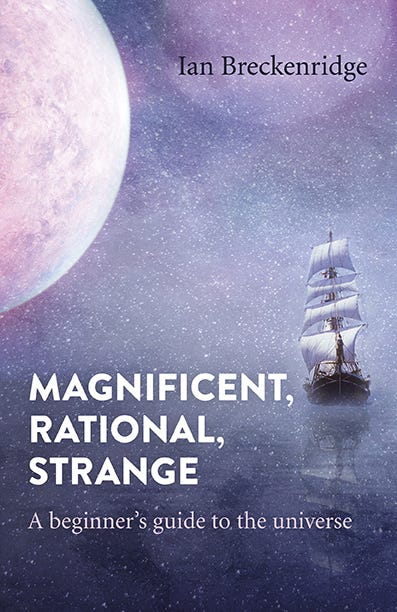Exploring the Universe: Beyond Materialism and Consciousness
Written on
Chapter 1: Unraveling the Mysteries of Existence
Ian Breckenridge, a former educator, seeks to explore the intricate dance of life, the elusive nature of time, the enigmas of infinity, and the profound connection between matter and energy. He delves into the biochemical marvels that fuel humanity's quest for understanding.
Breckenridge presents his insights in "Magnificent, Rational, Strange: A Beginner’s Guide to the Universe" (Iff Books, UK £11.99 / US $15.95, December 2021). He approaches the subject from a strictly materialist perspective, stating that his aim is to focus solely on the tangible world while relegating moral, psychological, aesthetic, and theological aspects to the background.
However, is this approach truly beneficial for those just starting their exploration? I would argue it falls short. It’s essential for beginners to grasp that the concept of reality is evolving through advancements in post-materialist science, which raises significant inquiries about morality, psychology, aesthetics, and theology. Breckenridge neglects to address these emerging perspectives and the potential for a new scientific paradigm in the twenty-first century.
He adheres to the reductionist-materialist view that consciousness arises from brain activity, seemingly oblivious to the significant challenges this notion faces in contemporary consciousness studies. Many now view consciousness as foundational and causal—essentially the core of existence.
Materialist frameworks struggle to clarify how mental functions and consciousness emerge from physical processes. A key principle of post-materialism posits that the mind cannot be reduced to mere physical phenomena; it does not originate from matter and cannot be simplified to something more basic.

Breckenridge believes his work is significant because it invites readers to contemplate the remarkable scientific breakthroughs of the past century. These developments touch on topics such as the Big Bang theory, black holes, quantum physics, the fabric of space-time, the origins of life, and humanity's unique place in the cosmos.
While he rightly encourages us to take a moment to appreciate the vastness of the universe, the narrative he constructs feels incomplete. He acknowledges our intricate nature as beings that reflect “the unique glory of this unimaginable, perfectly stunning, thoroughly improbable universe.” Yet, he simultaneously suggests that we are “tiny and insignificant,” echoing a defeatist notion of insignificance. It is contradictory to assert that one can embody both grandeur and triviality within the cosmic context.
Some may view my critique of Breckenridge as overly harsh. He has passionately engaged with popular science literature for over thirty years and, at 78, continues to marvel at the wonders of our existence. His enthusiasm is commendable; however, as science approaches a paradigm shift, it becomes necessary to challenge the prevailing views. While the methods and technologies rooted in materialist thought have undeniably yielded success, their dominance has distorted our self-perception and obscured our understanding of our place in the universe. In fact, this paradigm has impeded progress in the scientific examination of the mind, consciousness, and spirituality.
The enigmas surrounding creation cannot be unveiled through scientific materialism alone.
Having explored Hinduism, Taoism, and Buddhism as an agnostic, and subsequently reconnecting with his Christian roots as a Quaker, one might expect Breckenridge to acknowledge the complexities that warrant discussion in contemporary scientific discourse.
Raised in evangelical circles, Breckenridge is also the author of "Reclaiming Jesus: Making Sense of the Man Without the Miracles" (2011) and resides in Norfolk, England.